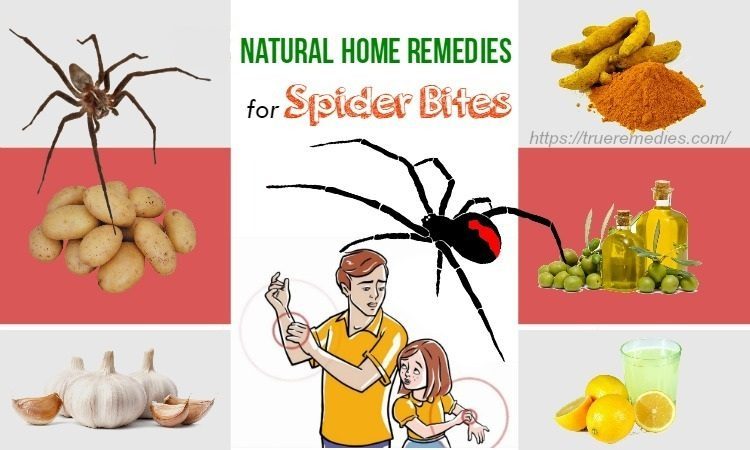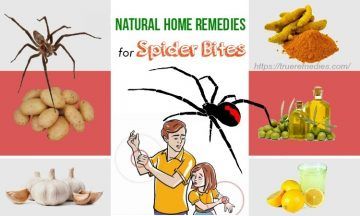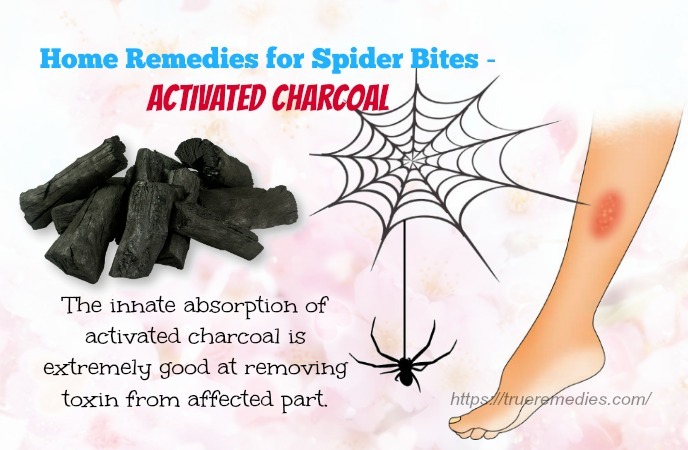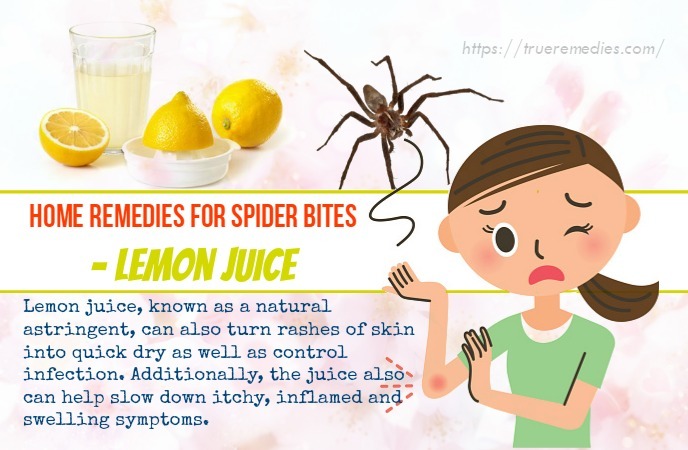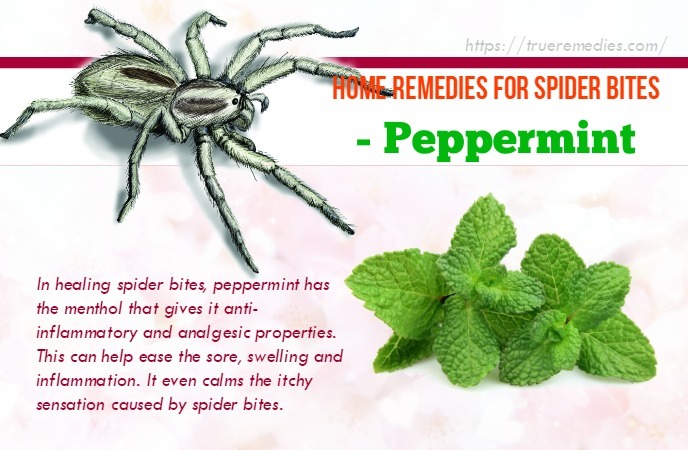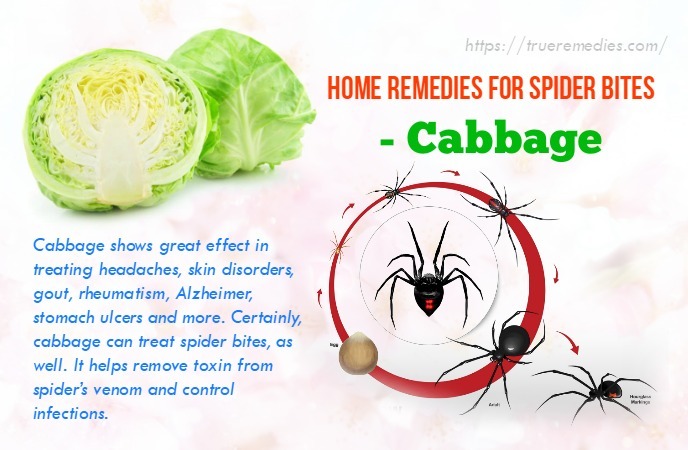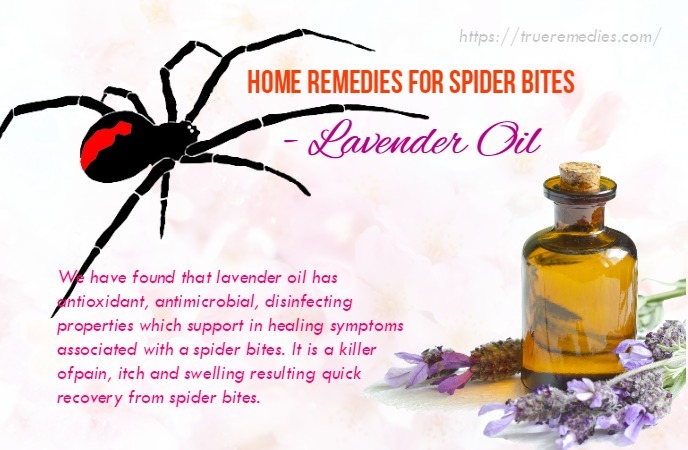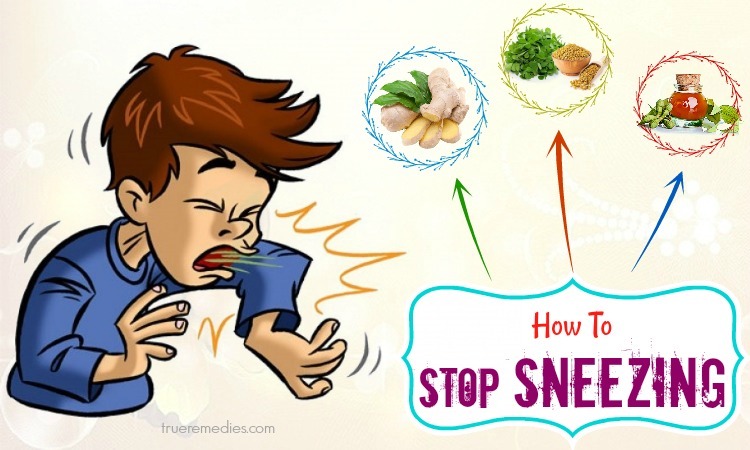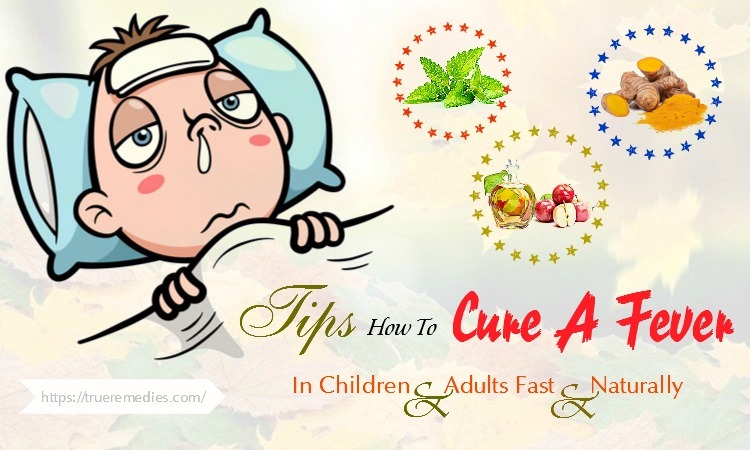updated: 11/19/2019
Contents
Spiders are eight-leg arthropods that most of you are familiar with. Researchers estimated that there had been at least 45,700 species of spiders and 113 families by November 2015. Because of their diversification, we can see them almost everywhere. Spiders are thought to be harmless, but in fact, they are not. Many people, especially little kids, are still bitten by them. Today, you, the victims of spiders, are reading this article to find out effective home remedies for spider bites on face, neck, and arms, but firstly you should understand what spider bites are. Let’s get started with basic information about spider bites.
- 37 Home Remedies For Ant Bites And Stings Swelling & Itching
- 20 Natural Home Remedies For Snake Bite On Humans
- 10 Effective Home Remedies For Bug Bites That Itch And Swell
What Are Spider Bites?
In most circumstances, spiders do not bite humans. They only do it to defense if they are stimulated or attacked. So how do you know that you are bitten by a spider? In the first case, you feel painful and irritating on your skin after you see a spider goes away. In the second case, you just have the same feeling as the first case, but you don’t see any bite or spider. Now, how do you know that it is the bite of a spider or other insects? In this case, remember that spider bite, also called arachnidism, is two small red or dark purple holes on your skin. This bite normally causes irritation and swelling. However, it is not poisonous, and it disappears within a few days. Spider bites need to be treated immediately after you see them, especially the bites on the skin of children[1] [2].
What Are Symptoms Of Spider Bites?
Before we take a deep look into the typical symptoms of spider bites, we need to know the truth that there are a variety of spider species. However, there are only three kinds of them which are internationally famous for their poison. They are Black Widow, Brown Recluse and Tarantula.
Three types of spider bites have the following common symptoms.
- A spider bite typically looks like two small red holes on your skin, like many other bug bites. The small red dots on the bite site are usually warm, achy, blistering, and inflamed with a big bump. Other symptoms are a high fever or chill, headaches, and difficulty in breathing. Generally, bites seem to be harmless at first; however, they can become serious quickly after a period of time.
And now we are going to note the different symptoms of the bites from three types of spider.
TrueRemedies Partner Solutions

Need a Help from the Leading Expert Online, Available 24/7?
They’re all here and ready to answer your questions online or by phone. Keep asking questions until you get the answer you need.
Black Widow Spider Bites: A bite of the black widow spider causes some symptoms below:
- Pain and swelling: You feel swelling and pain around the bite, which may spread into your abdomen, chest, or back.
- Cramping: You may experience severe stomach cramps that you sometimes mistake appendicitis.
- Sweating: You may suffer from sweating, chills or nausea and vomiting
Brown Recluse Spider Bites: The pain related to the bite of the brown recluse spider often increases during the first eight hours after you get the bite. You may have chills, a fever, and body aches. Usually, the bite disappears on its own after about 7 days. Sometimes the skin at the mouth of the bite gets purple or dark blue and then creates an open sore that gets bigger when the skin around the bite dies. The sore often stops growing after 10 days, but the full healing process may take months.
Tarantula Spider Bites: Tarantulas, known as the largest arachnids belonging to the Theraphosidae family of spiders that is said to have existed for millions of years. We can distinguish them from others by their hairy bodies.
If you are bitten by a poisonous tarantula spider, you can see some symptoms such as:
- Pain
- Difficulty in breathing
- Lack of blood to the main organs
- Puffy eyes
- Fast heart rate
- Tingling
- Itching and swelling
When To See A Doctor?
You should get prompt medical help from a doctor if you have any of these followings symptoms:
- You are not sure your spider bite is poisonous or not.
- The person who was injected by a spider is having breathing problems.
- The victim suffers from severe pain, belly cramps, and a growing ulcer at the spider bite.
You have just discovered some helpful information about spider bites on human. It is time to find out what the best natural home remedies for spider bites are.
28 Simple Home Remedies For Spider Bites On Face, Neck, Arm
1. Ice Pack
If you have a fridge at home, do not hesitate to use ice cubes as the first natural remedy. Placing an ice pack on your injected area may help you immediately reduce inflammation, swelling, and itch. According to WebMD, both heat and ice therapy are effective in relieving pain[3].
Directions:
- Clean your injury with water and soap.
- Use a bag, a T-shirt, or a towel to wrap ice cubes.
- Apply the ice to the bite for 10 minutes and then remove it.
- Repeat the process for a few times on the first day after a bite.
2. Cold Water
In case you feel too cold, and your skin becomes numb when you treat spider bites with an ice pack, you should replace by cold water. This cold water treatment has a similar effect with the ice pack, but it is less cold[4].
Directions:
- Wash your skin carefully with soap and water.
- Pour cold water into a basin.
- Dip your bite into that basin for ten minutes and then take out.
- Redo for a few times until you feel less painful.
If your water becomes less cold after a time of dipping, change the new cone for the next use.
3. Baking Soda
Baking soda is very popular in most kitchens. Baking soda, an alkalizing agent[5], helps to remove venomous toxin and decrease pain, redness and swelling on the skin. Let’s try to use baking soda to see how gorgeously effective it is.
Directions:
- Make a paste by mixing baking soda and water (or butter) at a ratio of 3:1
- Apply this poultice to your bite
- Clean the bite with warm water after five minutes.
- Do it again within the first few hours after the bite until you feel comfortable.
4. Salt
Salt is one of the natural home remedies for spider bites. There are many kinds of salt you can use, but sea salt or kosher is a better one. Why? It is because sea salt or kosher contains potent antiseptic and anti-inflammatory properties[6] that are beneficial in helping to draw out venomous toxin quickly and reduce redness and burning. Then, you will get a speedy recovery from the spite bite.
Directions:
- Clean up your affected skin thoroughly with warm water.
- Sprinkle some salt on a wet cloth or cotton pad.
- Wrap the bandage (the wet salt cloth) firmly around the injured part for one to two hours then take off.
- Repeat as needed.
5. Activated Charcoal
Activated charcoal[7] is another cheap remedy for spider bites. The absorbing characteristic of activated charcoal is extremely good at removing toxin from the affected part. After toxin goes away, you may get relief from tenderness and skin rash. Then your spider bite gradually heals.
Directions:
- Wash your injured skin with warm water.
- Make a paste from the activated charcoal and water.
- Put the paste on your bite and cover tightly with a bandage.
- Remove the bandage after two hours.
- Perform every two hours again on the first day, then only for a few times on the following days. Keep using the method until you feel satisfied with the result.
- You can take activated charcoal capsules after consulting for a doctor.
6. Potato
Normally, we use potatoes only for cooking. Potato, however, is a significantly effective treatment for spider bites. Using potato may reduce itchy feeling and inflammation due to its soothing and anti-irritating properties[8]. Furthermore, you can retain moisture for your skin by a potato, resulting in a fast recovery.
Directions:
- Wash the potato thoroughly with water.
- Peel the potato and then wash again.
- Use a grater to grate the potato.
- Take a thin cloth bag to keep all the wet potato shreds.
- Clean the wound with alcohol and then put the potato bag on it.
- Wait until the potato poultice dries out and discard it.
- Wash the affected skin with warm water.
- Repeat the procedure with another fresh potato until your symptoms are relieved.
7. Aspirin
Aspirin[9], or acetylsalicylic acid, is a popular medicine that is generally used for relieving minor aches and pains. It is also used to prevent inflammation and swelling. Besides, it may help to remove the toxin from insect venom. With all these beneficial characteristics above, we can use it as a good remedy for spider bites.
Directions:
- Clean up your affected part with warm water.
- Soak 1-2 aspirin pills into the water to form a paste.
- Apply the aspirin cataplasm to your injury. You may cover the injured area with a cloth to keep the poultice in place.
- After a couple of hours, take off the cloth and wash the wound carefully with lukewarm water.
- Repeat the process for one to two times, if needed.
8. Turmeric And Olive Oil
Turmeric, or Curcuma longa, which is known for its fragrant aroma and slightly bitter taste, is a common spice in cooking. Apart from cuisine purpose, turmeric powder has long used to cure many diseases. According to The National Center for Complementary and Alternative Medicine, by applying turmeric powder paste to your affected skin, the antioxidant properties of turmeric will help treat minor wounds, eczema, and inflammation. Besides antioxidant characteristic, this kind of powder also works as an antiseptic and a swelling-reducing agent[10]. Olive oil is loaded with vitamin A and E that may help repair skin damage. It adds moisture to your skin and soothes pain[11]. That is why we should use turmeric and olive oil as a natural painkiller for spider bites.
Method 1:
- Cleanse your bite with warm water.
- Mix 1 to 2 teaspoons of turmeric powder and olive oil to create a paste.
- Apply the turmeric cataplasm directly to the spider bite and leave it for twenty minutes.
- Clear the poultice and wash with warm water.
- Apply this paste two or three times a day.
Method 2:
- Wash your bite with warm water.
- Mix 2 teaspoons of turmeric, a handful of Indian lilac leaves, a little water, and olive oil. to make a thick paste
- Apply the poultice to your affected skin and leave it for about 20 minutes
- Wash it off with clean water.
- Repeat this method a few times if needed.
9. Lemon Juice
Lemon, thanks to its fresh scent, is habitually added to meals, juices, or plain water to make a healthy drink. It is high in vitamin C that may strengthen your immune system[12] and supply the skin with collagen. In fact, one ounce of fresh lemon juice contains 12 milligrams of vitamin C. This amount provides required daily intake as follows: 13 percent for men, 16 percent for women, 14 percent for pregnant women, and 10 percent for breastfeeding women. Lemon juice, known as a natural astringent, may also help to dry out skin rashes and control infection. Additionally, the juice helps reduce itchy, inflammatory, and swelling symptoms.
Method 1:
- Wash your wound thoroughly with warm water.
- Extract the juice from a fresh lemon.
- Soak a cotton ball or a cotton pad into the fresh lemon juice.
- Apply the cotton ball to your wound and leave it dry for five minutes.
- Clean the affected area with lukewarm water.
Method 2:
- Wash your skin thoroughly with warm water.
- Cut a fresh lemon into pieces.
- Rub a piece of lemon against your wound for about 2 to 3 minutes.
- Wait for five minutes to make the wound dry.
- Clean the area with lukewarm water.
Perform either of these ways for couples of times a day until your bite disappears.
10. Garlic
Garlic, known as Allium Sativum[13], is an herb that is widely used for culinary purpose. It is also used as a medicine to protect against many diseases such as respiratory diseases, poor digestion, specific parasites, tiredness, and so on. Garlic holds a powerful natural antibiotic, besides its antihypertensive, antibacterial, and anti-thrombotic properties[14]. According to research on the Journal of Antimicrobial Chemotherapy, fresh garlic is 100 times more effective than two normal antibiotic tablets for fighting bacteria[15]. With these advantages, garlic may play an important role in relieving symptoms of spider bites.
Directions:
- Cleanse your bite with warm water.
- Remove garlic skin and wash cloves of garlic thoroughly.
- Cut the cloves into slices.
- Put the garlic slices directly on your bite and secure it with a bandage.
- Leave it overnight.
- Do this again as needed.
11. Lemon And Garlic Mixture
As mentioned above, both lemon and garlic have potent antibiotic properties[16] that are beneficial in healing spider bites.
Directions:
- Clean your spider bite with warm water.
- Peel off garlic skin and crush garlic cloves well.
- Extract the juice from a raw lemon.
- Blend the crushed garlic cloves and lemon juice to make a paste.
- Put this mixture directly on your bite and keep it for half an hour.
- Remove it and wash again with warm water.
- Repeat until you are satisfied with the result.
12. Aloe Vera
When it comes to home remedies for spider bites, aloe vera is a great option. It is broadly used as a natural flavor for cooking. The gel from aloe vera is used for a wide range of different purposes. Moreover, it is also a herbal remedy because of its antioxidant and antimicrobial features[17]. Thanks to its natural antiseptic and anti-inflammatory effects, aloe vera may help victims of spider bites to moisturize the affected skin, ease the pain, and soothe swelling and itchiness.
Directions:
- Wash an aloe vera leaf thoroughly and take its gel.
- Clean your injury with warm water.
- Apply aloe vera gel to your spider bite.
- Keep it for half an hour and then rinse it with lukewarm water.
- Apply a few times per day for a couple of days.
Note: Keep the remaining gel in the fridge to use for the next time.
13. Peppermint
Aside from a superior flavor in culinary practice, peppermint is considered as one of the most valuable herbal treatments for many diseases such as muscle cramps, respiratory problems, headaches, memory loss, etc. The menthol in peppermint gives it anti-inflammatory and analgesic properties that help to heal spider bites effectively[18]. This may help ease the sore, swelling, and inflammation. It even calms down the itchy sensation caused by spider bites.
Method 1:
- Clean some fresh peppermint leaves thoroughly with water.
- Wash your wound carefully with warm water.
- Extract the juice from peppermint leaves.
- Using a cotton ball to rub it directly on the affected area and leave it for at least 20 minutes.
- Rinse it with cool water.
- Repeat two to three times a day if needed.
Method 2:
- Clean your wound with warm water and wait for your skin to become dry.
- Put 1 – 2 drops of peppermint oil on your affected skin.
- Reapply for 2 or 3 times per day.
Note: Remember to do a small patch test before applying the oil directly to your skin.
14. Basil Leaves
Basil plays a major role in preventing many diseases including headache, stomached, coughing, stress reduction, blood sugar, etc. and even minor pain such as spider bites. Basil has antibacterial and anti-inflammatory features[19] that may help to reduce itchiness, relieve the pain, and draw out toxin from spider venom.
Directions:
- Wash your irritated skin areas carefully with warm water.
- Clean some fresh basil leaves with water.
- Chew up or crush these basil leaves to make a paste.
- Rub this basil poultice directly on your affected skin.
- Secure it with a soft cloth and leave it for half an hour.
- Remove it and wash with lukewarm water.
Note: In case you do not have fresh basil leaves, you can use the dried basil leaves.
15. Onion
Onion, one of the best home remedies for spider bites, is often a white, red, or yellow plant that has a strong smell and taste. Onion, along with its pungent flavor, has been used for years not only for cooking but also for medical purposes. Onion is high in vitamins, minerals, and antioxidants. Furthermore, the enzymes in onion are able to fight inflammation[20]. Thanks to these gainful characteristics of onion, we find no doubt in using it for spider bites treatment.
Directions:
- Clean your affected area with warm water.
- Wash an onion thoroughly and remove the onion skin.
- Cut the onion into thin slices.
- Put the onion slices directly on your injury and leave them for a few minutes.
- Take them out and rinse off with water.
- Perform the above steps again as needed.
16. Hydrogen Peroxide
Hydrogen peroxide, represented as the formula H2O2, is a colorless chemical liquid that is well-known for its medicinal uses. It offers plenty of helpful usages such as healing boils, treating foot fungus, cleaning fridge or toilet bowls, removing tub scum, washing fruits and vegetables, whitening laundry, increasing germination of seeds, clearing acne, and so on[21]. H2O2 has a mild antibacterial characteristic; and therefore, it is used to treat insect bites. It also helps clean and disinfects minor injuries. In spider bite treatment, you can apply hydrogen peroxide to your wound to release oxygen and make foaming, which helps clear dead skin cells and clean the affected area.
Directions:
- Clean your wound area with warm water.
- Wait until your skin dries out.
- Apply a solution of hydrogen peroxide to the bite.
- Do it again for a few times daily until you get complete recovery.
Note: Hydrogen peroxide is for external use only. Do not drop in your eyes or use for a large area of skin and deep wound. Never swallow it when you accidentally take it orally.
17. Apple Cider Vinegar
Apple cider vinegar, made from cider or apples, is served in many dishes. It is not only familiar with cooking but also benefits your health. It shows great aid in controlling blood sugar, lowering blood pressure, detoxifying liver, promoting weight loss, etc. Moreover, apple cider vinegar contains antibacterial and anti-inflammatory properties[22] and helps your body balance the pH level. Thanks to this valuable health support, it may fight against harmful bacteria, ease the pain, and decrease the swelling, redness, and itching due to a spider bite. So why don’t we use it as a good remedy in healing spider bites?
Directions:
Method 1:
- Wash your affected area thoroughly with warm water
- Wait for your skin to become dry.
- Mix one cup of warm water and a half teaspoon of apple cider vinegar.
- Use a cotton ball to apply this liquid to your wound.
- Do it daily for a couple of times.
Method 2:
- Clean your wound carefully with warm water.
- Blend one glass of clean water and 2 tablespoons of apple cider vinegar to make a toner.
- Put this mixture into a spray bottle.
- Spray it on your affected skin every night.
- Perform the method again if needed.
Note: Never put fresh apple cider vinegar directly on your wound without mixing with water as the acidity may sting the skin.
18. Cabbage
Cabbage or headed cabbage, a leafy plant, is grown as a vegetable. It is widely used in daily meals as a favorite dish in many families. Do you know that cabbage has a lot of miracle healthy benefits? Yes, it aids in treating headaches, skin disorders, gout, rheumatism, Alzheimer, stomach ulcers, etc[23]. Certainly, cabbage may treat spider bites, as well. It helps remove toxin from spider venom and control infections.
Directions:
- Cleanse your affected skin with warm water.
- Rinse a cabbage thoroughly.
- Grate a cabbage leaf into small pieces.
- Put the grated cabbage leaves directly on your wound.
- Use a bandage to secure it and keep it overnight.
- Remove the bandage in the next morning and wash with lukewarm water.
- Repeat the natural method as needed.
19. Papaya
Papaya is a yellowish green fruit with black seeds that we can see everywhere. This kind of fruit consists of vitamin A and C, B complex vitamins, carotenes, and other phytonutrients that are believed to have antioxidant and beneficial properties. Today, we are going to see how papaya may treat spider bites. Researchers also found enzymes in papaya that may neutralize the venom, release pain, and swelling[24].
Method 1:
- Wash your affected area thoroughly with warm water.
- Peel off a papaya fruit.
- Remove seeds and cut a piece of papaya into slices.
- Put these papaya slices directly on your affected skin.
- Leave it for 45 minutes.
- Remove and wash with warm water.
Method 2:
- Clean your affected area thoroughly with warm water.
- Peel off a papaya fruit.
- Remove seeds and cut a piece of papaya to crush it.
- Lay the paste directly on your wound.
- Remove this paste after 45-60 minutes and wash with warm water.
- Do the method many times if needed.
20. Pineapple
Pineapple is a fruit which develops from a spike or head of flowers. It has a sweet flavor and white or yellow flesh with thick skin. Apart from using it as a type of food, it may be great in fighting many diseases such as asthma, blood pressure, diabetes, digestion, skin disorder, etc. And certainly, pineapple may also cure symptoms of spider bites. This type of fruit contains bromelain – a protein-digesting enzyme that has a natural inflammatory feature[25]. Bromelain is highly effective in decreasing bruise, swelling, healing time, and pain due to a spider bite.
Directions:
- Wash your spider bite carefully with warm water.
- Remove pineapple skin and cut it into slices.
- Place a slice of fresh pineapple on the bite area.
- Keep it for 20 minutes and then take it off.
- Rinse it with warm water.
- Repeat the method as needed.
21. Tea Tree Oil
Tea tree oil, also called Melaleuca alternifolia, is an essential oil that is extracted from the fresh leaves of the tea tree, native to Australia. It is renowned for its powerful purifying ability. So, this oil is widely used for treating many skin diseases. Tea tree oil is also used to heal bug bites, including spider bites. With its antiseptic, antibiotic, and disinfecting properties and the ability to reduce skin rash and burn[26], it may be a powerful treatment for spider bites.
Directions:
- Wash your affected skin carefully with warm water.
- Apply one or two drops of tea tree oil directly to your wound.
- Leave it for thirty minutes and rinse with warm water.
- Repeat the method when needed.
Note: Do not use tea tree oil for babies under six months. Apply a drop of tea tree oil to your hand first to test your reaction. If you are not allergic to this oil, it is safe for you to use it directly.
22. Lavender Oil
Lavender oil, an essential oil with a fresh scent, is obtained from the flower spikes of species of lavender. Traditionally, lavender oil has been used in creating perfumes for years. It also has many health benefits such as releasing stress and anxiety[27], slowing down aging, minimizing headaches, improving sleep[28], etc. Also, we have found that lavender oil has antioxidant, antimicrobial, disinfecting properties[29] that support in healing symptoms associated with spider bites. It helps to relieve pain, itching, and swelling, leading to quick recovery from spider bites.
Directions:
- Cleanse your affected skin thoroughly with warm water.
- Apply one or two drops of lavender oil directly to your injury.
- Leave it for 30 minutes and wash it off with warm water.
- Perform the method again when needed.
Note: Make a small patch test with one drop of lavender oil before using it.
23. Meat Tenderizer Powder
Meat tenderizer powder is a chemical powder that is made from papaya or pineapple. Yes, just look at its name, you will think of usage for making the meat soft in cooking. But today, you will see how amazing it can be when dealing with symptoms of spider bites. Meat tenderizer has papain that may break down toxins due to bug bites[30]. Actually, this powder may neutralize the venom and then reduce redness and swelling.
Directions:
- Use warm water to wash your spider bite.
- Mix meat tenderizer powder and a little water to form a paste.
- Apply this paste directly to your affected skin.
- Leave it for one hour and then remove it.
- Repeat the method if needed.
With all these above helpful home remedies for spider bites, you are now able to treat spider bites by yourself quickly wherever you are. Follow some of those remedies, and you will see how fully effective they are. Do you know any other exciting ideas for the article that we have mentioned above? Please feel free to share with us. Do not hesitate to drop your comments in the box below. We will reply as soon as possible.

